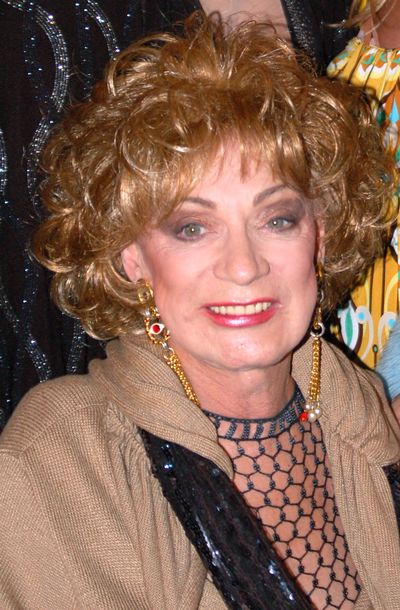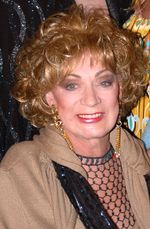
Email us to revise your entry or request it to be deleted.
Holly Woodlawn, an older light-skinned Puerto Rican woman with curled golden blonde hair, wears red lipstick, long gold earrings, and a sweater.
Puerto Rico
New York City, New York, United States of America
Puerto Rico (1946)
Los Angeles, California, United States of America (2015)
These are the yes/no and closed vocabulary terms that the Portal uses to filter search
results. They are not
necessarily the words this individual uses for themselves.
Learn more
Trans
Yes
BIPOC
Yes
Deaf and disabled
No Data
Gender identities
trans
Race/ethnicities
Latinx/Hispanic
When talking about iconic transgender women in contemporary history, one of the most well known in America is Holly Woodlawn. Her name was in popular songs. She starred in queer cult classics. For a time she was even paid to go to parties. She was an openly transgender woman and the first many Americans knew of. With such an important place in so many people’s memories, the Puerto Rican actress was well-loved by famous and ordinary alike. Born in Puerto Rico on October 26, 1946, Holly formed a close bond with her openly gay uncle. She understood that she was a woman early in her life. Together she and her uncle would go see films, and dance, she was also able to meet other transgender women at the beach. While she was lucky in these ways, her direct family was not as quickly accepting of her identity, calling in a religious authority to “fix” her. Because of this, Holly was forced to run away at the age of fifteen with other transgender friends; together they headed to New York. Though she was able to sell some of her mother’s jewelry, she also engaged in survival sex work. The instability that led to that part of her story would remain a theme in her life through to her arrival in New York City. For a time she lived with a man who mostly took care of her financial needs, but she soon found work with Andy Warhol—she hoped to become one of his superstars. Warhol was intrigued by her because, before she met him, she was already saying she was one of his superstars. He took her on to play a large part in his film Trash (1970). Her role was initially very shallow, but she began to ad-lib and, by the end, she became the co-start of the film with her mostly improvised lines. Trash would become one of the most well-received Warhol films, and according to many reviews, that was in large part because of Holly Woodlawn’s role. Her part was so beloved that a letter-writing campaign was started to consider her for an Academy Award as Best Actress—something that unfortunately never happened. Despite all of this, Holly was severely underpaid for her part in the film, getting twenty-five dollars a day. She received a sum total of one-hundred and twenty-five dollars. In an interview in 2007 she discussed this situation saying: "I was very happy when I gradually became a Warhol superstar. I felt like Elizabeth Taylor! Little did I realize that not only would there be no money, but that your star would flicker for two seconds and that was it. But it was worth it, the drugs, the parties, it was fabulous." In a later interview she said: “It was very confusing, at night I’d be riding in limousines to penthouses or going to gallery openings, signing autographs and blowing kisses at people. During the day I was going hungry and living in a hovel. I’d have to go to the Factory and beg Andy for money. All I got for that movie was $125 and he made millions. It was strange, it was exciting. I was young, 23,24 and when you are that young, everything is exciting. Now, forget it! Now security comes first, fun last.” What she may be most well known for is a verse in a song written by a man she met once. Lou Reed wrote the first verse of “Wild Side” describing Holly’s journey to New York. Counted now among one of the best songs of all time by Rolling Stone and one of the most successful points in Lou Reed’s career, Holly was by all accounts confused and discomforted by the song. For Holly herself, her career would begin to flag as time went on. Not due to lack of talent, but because of consistent financial insecurity that would haunt her throughout her life. Though she did other films and worked other jobs, she wasn’t paid nearly as much as other actors of her time. She was forced to move back to Puerto Rico, now with her family’s support. It’s easy to dismiss this as a result of her working mostly small productions; the films she worked weren’t exactly blockbusters. However, they were cult classics and made money. Holly did not. When she was diagnosed with cancer and expressed a desire to live out her last days in her home, there was a fundraiser set up for her to do just that. It can’t be ignored that one shouldn’t have to be dying to finally get the support they deserve. While it has often been a tragedy that attracts the attention of those who can give, the consistent work of marginalized people is easy to take for granted. Some of the biggest shapers of culture have been queer people, and that labour is often un(der)paid. Making great art has always been something that queer people have excelled at, but it is often at the cost of their own security. That hasn’t changed much over time. Sometimes this takes the shape of emotional and other undervalued types of labour, another shape is that of queer people being scared to ask for the pay they deserve, or even not valuing themselves highly which people around them take advantage of to take their work without paying them properly. For Holly, it seemed to be a mix of all three. As N.K. Jemisin writes: “What good does it do to be valuable, if nobody values you?” After her death on December 6, 2015, she was finally recognized by the Academy Awards in the Memoriam segment.
Making Queer History. “Dec 16 Holly Woodlawn,” n.d. https://www.makingqueerhistory.com/articles/2019/12/16/holly-woodlawn.Warhol Superstar Holly Woodlawn was born on October 26, 1946, as Haroldo Santiago Franceschi Rodriguez Danhakl. She left home at 16 and hitchhiked to New York. Woodlawn did whatever she had to do to survive. She describes the hardships of her teenage years in her memoir, A Low Life in High Heels: “At the age of 16, when most kids were cramming for trigonometry exams, I was turning tricks, living off the streets and wondering when my next meal was coming.” Woodlawn was eventually was cast in Jackie Curtis’ play, Glamour, Glory and Gold (The Life and Legend of Nola Noonan Goddess and Star). The second production of Glamour, Glory and Gold was one of Robert De Niro’s first performances. Woodlawn claimed that she was one of Warhol’s superstars when she was, though she was never veritable a superstar in the way that others who frequented The Factory Warhol. However, she was still able to intrigue Warhol and Morrisey when they discovered her. Morrissey was the first to cast her in the film Trash and later in Women in Revolt. Like other Warhol superstars, she is also referenced in Lou Reed’s “Walk on the Wild Side,” specifically in the lyrics “Holly came from Miami F.L.A / Hitchhiked her way across the U.S.A.” Holly Woodland passed away on December 6, 2015.
Revolver. “Warhol Superstar Holly Woodlawn,” n.d. https://revolverwarholgallery.com/superstars/warhol-superstar-holly-woodlawn/.-
Women In Revolt
film/video, 1971
Actor
-
Superstar in a Housedress
film/video, 2004
Actor
-
Beautiful Darling
film/video, 2010
Actor, Thanks to…
-
She Gone Rogue
film/video, 2012
Actor
-
Transparent
TV series, 2014
Actor
-
Disclosure: Trans Lives on Screen
film/video, 2020
Thanks to…
Email us to revise your entry or request it to be deleted.




